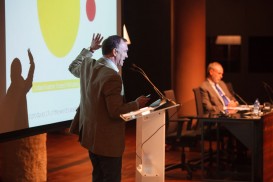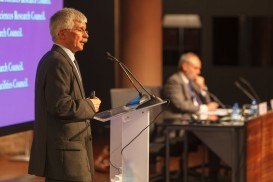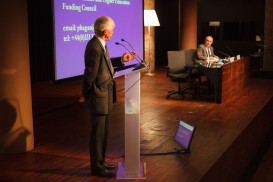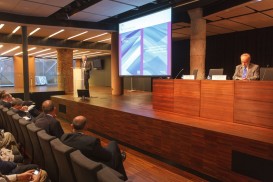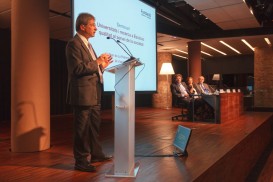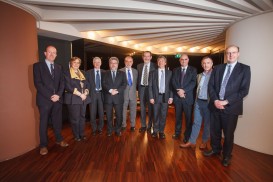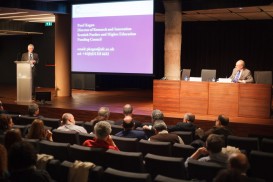ACUP and Universities Scotland have signed a collaboration agreement to share experiences and knowledge in higher education
The Association of Catalan Public Universities (ACUP) and Universities Scotland signed a collaboration agreement to share experiences and knowledge in their respective fields of higher education and university governance. Both entities aim to promote joint projects and to strengthen the relationship between Scottish and Catalan universities. The agreement will also facilitate the movement of academic staff, graduate and undergraduate students among both countries to improve teaching and learning.
The collaboration between Universities Scotland and ACUP was signed after the celebration on April 24 of the seminar ‘Universities and research in Scotland at the service of society’. The event, held in the Auditorium of La Pedrera in Barcelona with the collaboration of Fundació Catalunya-La Pedrera, introduced the Scottish higher education and research system to the public s in order to extract procedures and experiences that could be useful for our country. The seminar took shape after a Catalan delegation visited Scotland in autumn 2012 and throughout meetings with leaders of higher education of this country.
During the seminar the government and the universities of Scotland representatives highlighted the success of a system characterized by meritocratic access to education, a strong tradition of university autonomy and a strong commitment to internationalization. Ferran Sancho, UAB Rector and President of the ACUP, described the Scottish education system as "a good reference for us”. Marta Lacambra, director-general of the Fundació Catalunya-La Pedrera emphasized the "common challenges" which are currently facing Scotland and Catalonia. Antoni Castellà, secretary for Universities and Research of the Catalan Government, stressed the uniqueness of the university systems of both territories and the "synergies" that can be set between them.
The visiting delegation was comprised of representatives of the Scottish government and universities. Andrew Scott, Director of Employability, Skills and Lifelong Learning of the Scottish government said that higher education policy in Scotland is inspired by the concept of "intellectual democracy". Scott argued that this means that access to the university "should be meritocratic" and therefore, "if the student has a desire to learn, we help him whatever their social and economic conditions are." The government representative also stressed the vital importance of the research for "a small-scale economy" as the Scottish one.
On the other hand, Alastair Sim, director of Universities Scotland, exposed the mission of this entity arguing its aims are to "influence public policy issues of higher education and to promote the contribution of universities to the country's development”. Paul Hagan, of the Scottish Funding Council, explained the research funding in Scotland, highlighting the importance of the internationalization process. Ian Diamond, director of the University of Aberdeen, stated there is a "relationship between university autonomy and good governance of universities, which is a characteristic of the Scottish system". Diamond also warned that his university receives "very good curriculums from Catalonia" and warned of the danger of letting leave the talent. Finally, Sandy Kennedy representing the Saltire Foundation talked about the promotion of entrepreneurship and innovation in Scottish universities.
The Minister of Economy and Knowledge of the Catalan Government, Andreu Mas-Colell, concluded the seminar emphasizing that "the crisis' impact on Catalan universities is high, but for the first time a Grant Program guarantees fairness in the access to university”. He added that "Catalan university fees are moderate compared to European standards but we are not going to increase them".
Attached is the seminar program, the Scots speakers curriculums and their presentations.
